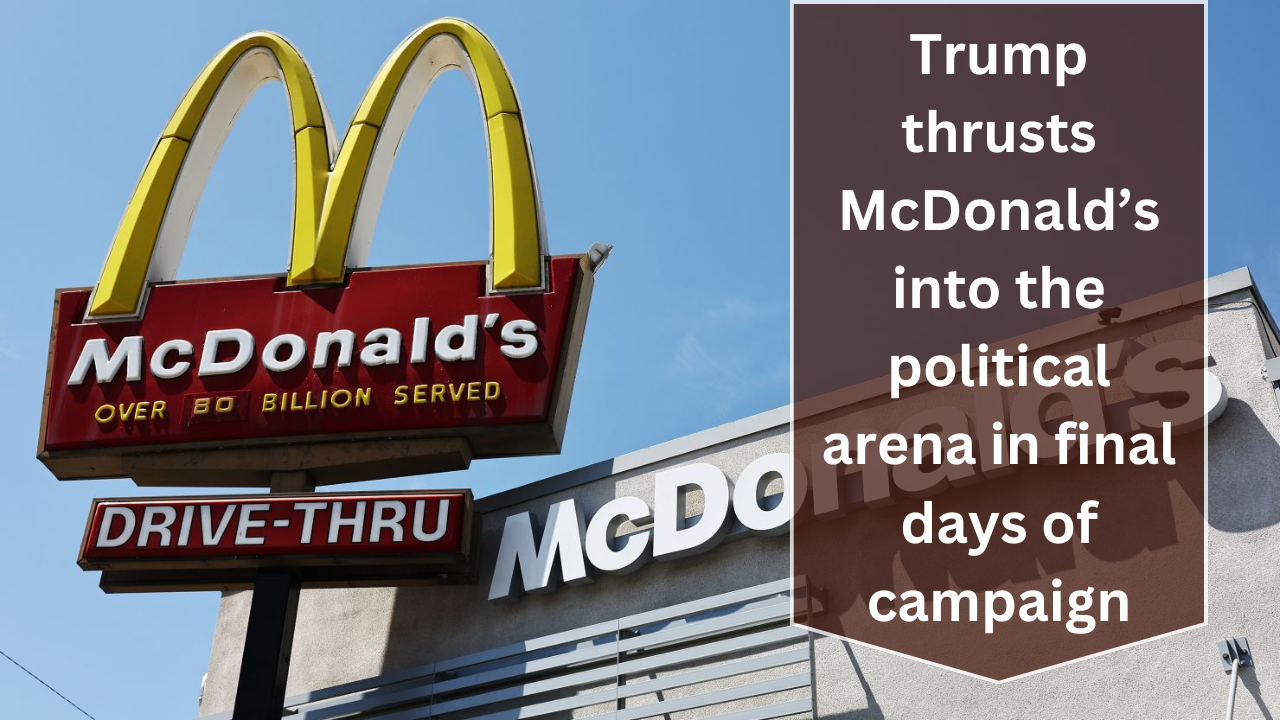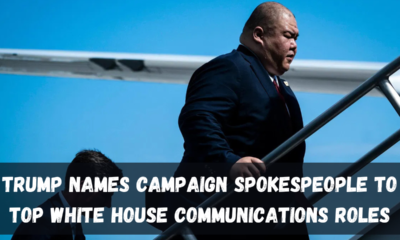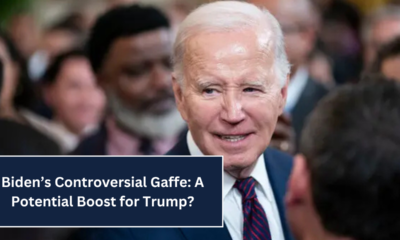Politics
Trump uses McDonald’s to enter politics in the last few days of his campaign.
Published
1 month agoon
By
Supriya
Former President Donald Trump has not only been concentrating on his political agenda in the last weeks of the campaign, but he has also turned his attention to the world of fast food, more notably McDonald’s. Conversations have been generated on how brands may become symbols in political narratives and how they can affect public mood as a result of this unexpected intersection of politics and fast food industry.
The Phenomenon of Fast Food Restaurants
A significant element of American society for a very long time, fast food is a symbol of convenience, affordability, and, for many people, nostalgia. One of the most well-known companies in the world, McDonald’s, frequently acts as a microcosm of larger cultural trends because of its widespread recognition. From Ronald Reagan’s use of the chain as a symbol of American prosperity to campaigns that highlight healthy eating against the backdrop of rising obesity rates, it has appeared in a variety of political contexts over the course of its lengthy history.
Read more :- Spotlight on America: Harris’s Media Push and Trump Rallies Dominate Public Attention
Both throughout his administration and throughout his campaign, Donald Trump’s relationship with McDonald’s has been particularly visible. Known for his love of fast food, Trump has leveraged this inclination to connect with his following. He frequently chooses burgers and fries as his meal of choice. He effectively uses a brand that is familiar to millions of Americans by including McDonald’s into his campaign narrative. This allows him to draw comparisons between his policies and the actions that his followers take on a daily basis.
McDonald’s as a Symbol of Freedom

As the campaign draws to a close, Donald Trump has used McDonald’s not only as a reference to the food industry but also as a symbol of his political beliefs. By portraying the chain as a representation of traditional American ideals and the working class, he has stressed the chain’s significance in American society whenever he has given speeches or rallies. Both his image as a populist candidate and his ability to engage with voters on a personal level are strengthened by this strategy, which serves a dual function.
In the eyes of many fans, Trump’s endorsement of McDonald’s strikes a chord of profound significance. The statement implies that the leader is aware of the preferences and tastes of the average American. Trump is able to effectively intertwine his political message with daily American experiences by establishing McDonald’s as a staple in his political discourse. This provides an appeal to the voters’ sense of nostalgia and familiarity with the brand.
A Discussion on the Controversy Surrounding Fast Food in the Political Arena
Having said that, this technique is not without of potential controversy. The use of fast food in political language, according to critics, serves to oversimplify complicated topics and divert attention away from meaningful policy concerns. Concerns over health, labor methods, and the influence that the fast-food sector has on the environment have been brought to the forefront of public attention. Trump runs the danger of losing more progressive voters who place a higher priority on health and sustainability; he has aligned himself with McDonald’s.
Additionally, the juxtaposition of a fast-food brand with serious political debate throws into question the authenticity of the message being conveyed. A number of voters might consider this strategy to be nothing more than a gimmick, which would be detrimental to the gravity of the issues that are at stake in the election. Critics contend that it is a prime example of the larger phenomenon of political branding, in which candidates place a greater emphasis on their appearance than on their actual policies.
Regarding the Influence on the Attitudes of Voters

It would suggest that a sizeable section of the electorate is in agreement with Trump’s policy, despite the possibility of opposition. The results of the poll indicate that a significant number of voters value his genuineness and his capacity to strike a chord with their everyday lives. Trump is able to connect into a cultural experience that his fans have in common by referring to McDonald’s, which helps to develop a sense of community among his supporters.
Moreover, McDonald’s is a symbol that transcends party lines for some people, serving as a unifying representation. Many people in the United States, regardless of their political orientation, have positive memories of eating at McDonald’s, despite the fact that it is frequently associated with political conservatism. The universality of this concept has the potential to establish an emotional connection that promotes voter loyalty.
The Function of Social Media in Today’s World
In addition, the Trump campaign has made good use of social media in order to magnify the impact of his message. McDonald’s supporters have shared their personal experiences and recollections that are connected to the fast-food company in response to posts that include the fast food business and make allusions to the brand. While concurrently bolstering his brand image, this grassroots promotion raises awareness of his initiative and increases its visibility.

On the other hand, opponents have been able to criticize Trump’s statements on fast food by using social media as a forum. As a result of his reliance on McDonald’s as a political instrument, memes and counter-narratives have evolved, making light of his decisions. As a result of this dynamic, it is clear that fast food may rapidly become a battlefield for political discourse, with both sides competing for the perception of the general public.
Read more :- Shakira postpones the ‘Las Mujeres Ya No Lloran’ tour.
The more far-reaching implications for candidate campaigns in politics
In political campaigns, candidates are increasingly leveraging brands to engage with voters, and Trump’s concentration on McDonald’s reflects a growing trend in this area. This phenomena brings up significant concerns regarding the direction that political debate will go in the future. Candidates may need to understand how to traverse the difficult landscape of consumer opinion and brand loyalty as political identities grow more intertwined with brands.
Brands such as McDonald’s have the potential to become fightgrounds for ideological confrontations when the political climate is politicized. As a result of being connected with a candidate in whom they have faith, supporters may experience a sense of ownership over the brand, whereas opponents may attempt to undermine the legitimacy of that identification. The repercussions of this dynamic can be seen in the real world, where it can have an effect on consumer behavior and perceptions of brands.
Concluding remarks
Not only does Trump highlight the distinctive approach he takes to politics by including McDonald’s into his campaign narrative, but he also highlights the confluence of consumer culture and political identity. It is possible that this technique will prove to be crucial in the last days of the campaign, drawing in voters who have not yet made up their minds and rousing his support. The fact that it does so, however, brings up some very relevant considerations regarding the role that brands play in moulding political discourse and the potential ramifications that could result from the commercialization of political identities.
A reminder of the intricate ways in which food, culture, and politics are intertwined in the complicated fabric of American society, the image of Donald Trump and McDonald’s will certainly continue to remain in the public consciousness as the election draws near. One thing is certain, however: the connection between fast food and politics is as significant as it has ever been. It needs to be seen whether this strategy ultimately helps to boost or harm his campaign.
You may like
-


Does Exercise Boost Metabolism?
-


Cancer Prevention Diet
-


Trump Names Top Campaign Spokespeople to Key White House Communications Positions
-


Biden’s Controversial Gaffe: A Potential Boost for Trump?
-


The Innocent Sisters: Pennsylvania Nuns Falsely Accused of Voter Fraud
-


“Obama’s Call for Action: The ‘Fierce Urgency of Now’ as Trump Seeks Power Again”
